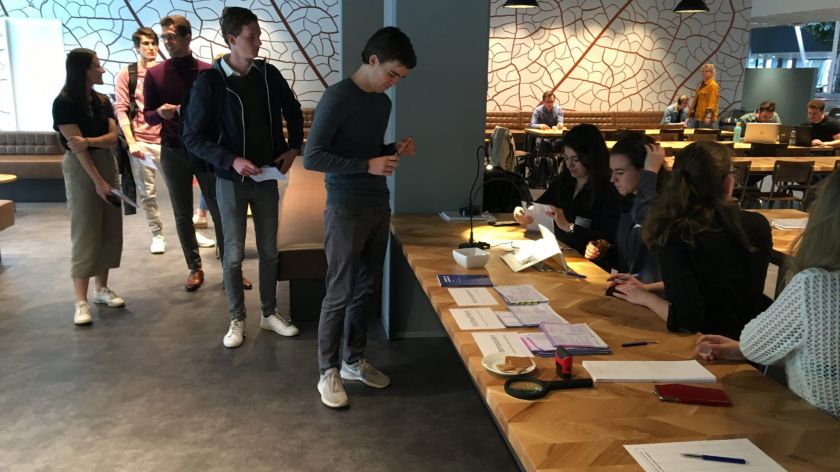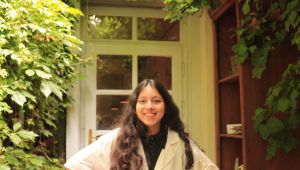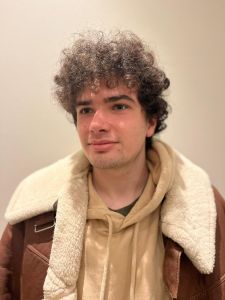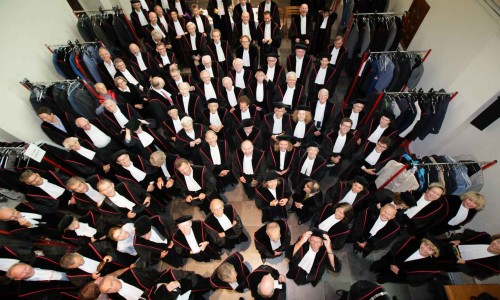Internationals on Dutch Elections: ‘Right now I want to stay as long as possible’
-
 Voters cast their votes in the Refter for the European elections
Voters cast their votes in the Refter for the European elections
On November 22, the election for the Dutch House of Representatives takes place. One of the issues emphasised by many parties this year is the curbing of internationalisation in Dutch higher education. But what do international students themselves think about the political debates regarding their position in Dutch society?
Overcrowded classrooms, a lack of student housing, and too large of a workload for teachers. According to several Dutch parties and politicians, the solution to these challenges in Dutch higher education is to limit the number of international students in the Netherlands. The rightwing VVD wants to limit the number of international students who are admitted to university courses. Far-right PVV, centre-left GL-PvdA and centre-concervative CDA and NSC favour limiting the number of English-taught programmes instead.

The German student Henrik Maximilian Breuer (21) has just started his bachelor’s degree in Comparative European History this September. He understands the reasoning behind the discussion, but is skeptical about the proposals that the parties have put forward to limit internationalisation: ‘I understand that they want to give more Dutch students a position in higher education, but they also have to realise that as a member of the EU, they have to uphold some laws. If an EU national has fulfilled all the requirements, they cannot just decline the person because they are not Dutch.’
While Breuer is new in the Netherlands, his interest in politics has encouraged him to keep an eye on Dutch politics and the upcoming elections. ‘I read through the programmes of the parties that are currently holding seats in the Parliament and Pieter Omtzigt’s NSC (New Social Contract).’ Breuer has noticed that the parties discussing the internationalisation issue are mostly right-wing conservatives. ‘I see their calls for limiting internationalisation in higher education institutions as a roundabout way of saying that they don’t want any immigration into the Netherlands.’
Higher tuition fees
Like Breuer, Jayla Abdullayeva from Azerbaijan also started her studies at Radboud this September. For now, the 19-year-old law student is on an Erasmus exchange in Nijmegen but loves the Netherlands so much that she is thinking about staying. ‘If possible, I want to stay next semester and finish my bachelor’s degree here. And I might do a master’s degree in Maastricht, Utrecht, or Eindhoven. But nothing is decided yet.’

The possibility of increasing tuition fees even more for non-EU/EEA students worries the student a bit: ‘When it comes to international students, I think it is important to choose the most talented students instead of the richest.’ For Abdullayeva, having people from different cultures in university classrooms is a plus for higher education. ‘Only then we will have diverse conversations about the things we are learning. It also helps in comparing different ideas and deciding on the best practices overall.’
When thinking about the future, the student does not yet know what this debate will mean for her. But she has noticed one important thing over the last few months: that the Netherlands – and the Dutch people she has met – have been very welcoming and friendly. ‘Right now I want to stay as long as possible, if they send me home that would be very sad.’
Free language courses
Ruben Spizak has been studying at Radboud since 2021 already. The German student is in the third year of his psychology bachelor. Despite living here for a while, the 23-year-old doesn’t know much about the debates on internationalisation prior to the election. ‘I have heard that the topic is being discussed, but I have never had in-depth conversations about it.’
For Spizak, the biggest problem is that many international students do not stay in the Netherlands after graduation and thus do not contribute to Dutch society once they are done with university: ‘I hear from a lot of German psychology students that they go back to Germany or somewhere else once they are done studying their bachelor‘s. I think the best way to deal with the issues is to make it more attractive to international students to stay in the Netherlands.’

According to the 23-year-old, a way to make it more attractive for international students to stay in the Netherlands after graduation would be to increase the number of English-taught master’s degrees or to introduce additional free language courses at university. ‘I think my own future in the Netherlands is already shaky because if I stay here, I probably will need Dutch for my master’s degree. I already did the two free Dutch courses at the university but I still need more to reach a level at which I could study at university – and I need to pay for those myself.’
When it comes to the election outcome Spizak is not too worried. ‘The master’s degree I want to do is already in Dutch so the changes they are debating won’t have a huge impact on me personally. But generally speaking, I think it is good to include people from abroad, especially in master‘s programmes, because there is a higher likelihood that they will integrate and stay.’



